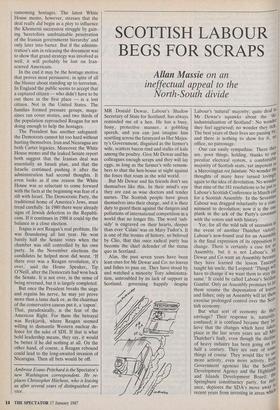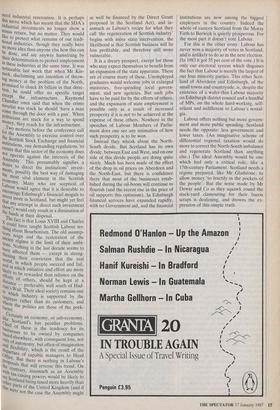SCOTTISH LABOUR BEGS FOR SCRAPS
Allan Massie on an
ineffectual appeal to the North-South divide
MR Donald Dewar, Labour's Shadow Secretary of State for Scotland, has always reminded me of a hen. He has a busy, fussy, protective manner, a gobbling speech, and you can just imagine him scuttling across the farmyard as Her Majes- ty's Government, disguised as the farmer's wife, scatters bacon rind and stalks of kale among the poultry. Give Mr Dewar and his colleagues enough scraps and they will lay eggs, as long as the farmer's wife remem- bers to shut the hen-house at night against the foxes that roam in the wild world.
But Mr Dewar and his friends don't see themselves like this. In their mind's eye they are cast as wise doctors and tender nurses. The Scottish people have given themselves into their charge, and it is their duty to guard them against the dangers and pollutions of international competition in a world that no longer fits. The word 'sub- sidy' is engraved on their hearts, deeper than ever 'Calais' was on Mary Tudor's. It is one of the ironies of history, so beloved by Clio, that this once radical party has become the chief defender of the status quo in Scotland.
Alas, the past seven years have been lean ones for Mr Dewar and Co: no loaves and fishes to pass on. They have stood by and watched a minority Tory administra- tion, untroubled by its lack of support in Scotland, governing happily despite Labour's 'natural' majority, quite deaf to Mr Dewar's squawks about the 'de- industrialisation of Scotland'. No wonder they feel aggrieved; no wonder they itch. The best years of their lives are passing by' and there is nothing to show for it, ne office, no patronage. One can easily sympathise. There they are, poor things, holding, thanks to our peculiar electoral system, a comfortable majority of Scottish seats, yet impotent as a Merovingian roi faineant. No wonder the thoughts of many have turned lovingly again to the idea of devolution. No wonder that nine of the 181 resolutions to be put t,°, Labour's Scottish Conference in March ill for a Scottish Assembly. In the Seventies Labour was dragged reluctantly to a co, mitment to devolution; now it is the one plank in the ark of the Party's covenant with the voters and with history. Yet, for all the wild talk of secession in the event of another Thatcher victory' Labour's new-found zeal for an Assembly is the final expression of its opposition change. There is certainly a case for ail Assembly, but it is not Labour's. Mr Dewar and Co want an Assembly because. they have learned the lesson Tarlac!, taught his uncle, the Leopard: 'Things will, have to change if we want them to stay the same.' It could be called Labour's Sicilian Gambit. Only an Assembly promises to le', them resume the dispensation of loaves and fishes; only an Assembly will let then/ exercise prolonged control over the Scot" tish economy. But what sort of economy do they envisage? Their response is, naturally' confused; it is confused because they be: lieve that the changes which have take' place in the last seven years are all N415 Thatcher's fault, even though the decline of heavy industry has been going on for half a century. They are sure of some things of course. They would like to see more activity, even more activity, frel_ht° Government agencies like the Scott" Development Agency and the Highlands and Islands Development Board: rif Springburn constituency party, for ins' ance, deplores the SDA's move awaY.,h'„ recent years from investing in areas need industrial renovation. It is perhaps this move which has meant that the SDA's industrial investments no longer show a minus return, but no matter. They would like to protect what remains of our tradi- tional industries, though they really have no more idea than anyone else how this can be done, and are anyway hamstrung by their determination to protect employment in these industries at the same time. It was noticeable last week that when Mr Kin- nook, disclaiming any intention of throw- ing money at the problem of the North, Promised to chuck £6 billion in that direc- tion, he could offer no specific target except the infrastructure. Raymond Chandler once said that when the crime novelist was stuck he should 'have a man come through the door with a gun'. When Politicians are stuck for a way to spend Money, they reach for the infrastructure. Two motions befOre the conference call for the Assembly to exercise control over the Scottish Stock Exchange and financial institutions, one demanding regulations `to ensure that this sector of the economy does not operate against the interests of the embly'. This presumably signifies a desire to direct the institutions' invest- ments, possibly the best way of damaging the most vital element in the Scottish economy. Many who are sceptical of Labour would agree that it is desirable to encourage Edinburgh's financial moguls to invest more in Scotland, but might yet feel that any attempt to direct such investment the funds at their disposal. The fact is that Louis XVIII and Charles il.could have taught Scottish Labour no- ti.nng about Bourbonism. The old assump- a`ions reign and the restoration of the t.11eien regime is the limit of their ambi- tions. Nothing in the last decade seems to tHhave affected them — except in streng- thening their conviction that the real ,3,rid, in which people succeed and fail, nhu in which initiative and effort are more ,If'felY to be rewarded than reliance on the distance — preferably well south of Had- iian's Wall. Their ideal society remains one which industry is supported by the ,x Payer rather than its customers, and o ,"arrei nere the politics are those of the pork- li,Cettainly an economy, or sub-economy, Scotland's has peculiar problems. b`'Ilief of these is the tendency for its usinesses to be owned by companies se. d elsewhere, with consequent loss, not o anY of autonomy, but often of imagination _,I eflexibility, which is the result of the c,'?..arture of capable managers to Head "'trice. But there is nothing in Labour's Proposals th_ that will reverse this trend. On wir contrary, inasmuch as an Assembly a' tax-raising powers would be likely to ! Scotland being taxed more heavily than tts!iet parts of the United Kingdom (and if 'us were not the case the Assembly might
as well be financed by the Direct Grant institutions are now among the biggest employers in the country. Indeed the whole of eastern Scotland from the Moray Firth to Berwick is quietly prosperous. For the most part it doesn't vote Labour. proposed in the Scotland Act), and in- asmuch as Labour's recipe for what they call 'the regeneration of Scottish industry' begins with mire state intervention, the likelihood is that Scottish business will be less profitable, and therefore still more vulnerable.
It is a dreary prospect, except for those who may expect themselves to benefit from an expansion of the state apparatus. There are of course many of these. Unemployed graduates would welcome jobs in enlarged ministries, free-spending local govern- ment, and new agencies. But such jobs have to be paid for by the efforts of others, and the expansion of state employment is possible only as a result of increased prosperity if it is not to be achieved at the expense of these others. Nowhere in the speeches of Labour Members of Parlia- ment does one see any intimation of how such prosperity is to be won. Instead they wheak about the North- South divide. But Scotland has its own divide, between East and West, and on one side of this divide people are doing quite nicely. Much has been made of the effect of the drop in oil prices on Aberdeen and the North-East, but there is confidence there that most of the businesses estab- lished during the oil-boom will continue to flourish (and the recent rise in the price of oil supports this optimism). In Edinburgh financial services have expanded rapidly, with no Government aid, and the financial For this is the other irony. Labour has never won a majority of votes in Scotland, and is unlikely to do so in the next election. (In 1983 it got 35 per cent of the vote.) It is only our electoral system which disguises the fact that Labour is merely the largest of our four minority parties. This other Scot- land of Aberdeen and Edinburgh, of the small towns and countryside, is, despite the existence of a wafer-thin Labour majority on Edinburgh district council and a handful of MPs, on the whole hard-working, self- reliant and indifferent to Labour's nostal- gia.
Labour offers nothing but more govern- ment and more public spending. Scotland needs the opposite: less government and lower taxes. (An imaginative scheme of differential regional taxation would do more to correct the North-South imbalance and regenerate Scotland than anything else.) The ideal Assembly would be one which had only a critical role, like a 17th-century Parliament. Scotland needs a regime prepared, like Mr Gladstone, to allow money 'to fructify in the pockets of the people'. But the noise made by Mr Dewar and Co as they squawk round the stack-yard clamouring for their bacon scraps is deafening, and drowns the ex- pression of this simple truth.











































 Previous page
Previous page